Asian markets shrug off tech-led selloff on Wall Street
Asian markets are mostly higher after a historic plunge in the stock price of Facebook's parent company helped yank other tech stocks lower on Wall Street

Your support helps us to tell the story
From reproductive rights to climate change to Big Tech, The Independent is on the ground when the story is developing. Whether it's investigating the financials of Elon Musk's pro-Trump PAC or producing our latest documentary, 'The A Word', which shines a light on the American women fighting for reproductive rights, we know how important it is to parse out the facts from the messaging.
At such a critical moment in US history, we need reporters on the ground. Your donation allows us to keep sending journalists to speak to both sides of the story.
The Independent is trusted by Americans across the entire political spectrum. And unlike many other quality news outlets, we choose not to lock Americans out of our reporting and analysis with paywalls. We believe quality journalism should be available to everyone, paid for by those who can afford it.
Your support makes all the difference.Asian shares were mostly higher Friday after a historic plunge in the stock price of Facebook’s parent company helped yank other tech stocks lower on Wall Street
Hong Kong jumped 3.3% after reopening from Lunar New Year holidays. Shanghai remained closed. Tokyo, Seoul and other regional markets were higher.
Thursday’s retreat in New York ended a four-day winning streak for the market.
The 26.4% wipeout in Meta Platforms, as Facebook’s owner is now known, erased more than $230 billion in market value, easily the biggest one-day loss in history for a U.S. company. The stocks of other social media companies including Twitter and Snap also fell.
Because Meta is valued so highly, a big swing in its stock price can also sink or lift broader market indexes. The S&P 500 fell 2.4%, its biggest drop in nearly a year, to 4,477.44.
The tech-focused Nasdaq composite gave up 3.7%, its biggest loss since September 2020, closing at 13,878.82. The Dow Jones Industrial Average which does not include Meta Platforms, fell 1.5% to 35,111.16.
Small company stocks also fell. The Russell 2000 index lost 38.48 points, or 1.9%, to 1,991.03.
But Asian markets were little affected. Trading has been muted this week, with Chinese markets closed and coronavirus cases still surging in Asia, especially in Japan and Hong Kong,
Hong Kong's Hang Seng rose 775 points to 24,577.36. The Nikkei 225 in Tokyo added 0.7% to 27,439.99. South Korea's Kospi advanced 1.6% to 2,750.26. In Sydney, the S&P/ASX 200 reversed early losses to gain 0.6%, closing at 7,120.20.
India's benchmark Sensex lost 0.3%, to 58,609.26.
Investors are watching for the latest update on the recovering U.S. jobs market. The Labor Department will release its monthly report for January on Friday.
On Wall Street, Meta sank after forecasting revenue well below analysts’ expectations for the current quarter following privacy changes by Apple and increased competition from TikTok. It was a disappointment for a company that investors have become accustomed to delivering spectacular growth. Meta also reported a rare decline in profit due to a sharp increase in expenses as it invests in transforming itself into a virtual reality-based company.
The steep drop weighed on fellow social media company Twitter, which fell 5.6%. Snapchat's parent company Snap sank 23.6% and Pinterest lost 10.3%. Snap soared 54% and Pinterest vaulted 28% in after-market trading after each reported better-than-expected results. Amazon.com jumped 18% in after-hours trading after reporting strong fourth-quarter results despite supply chain snags.
Big technology and communications companies played a big role in driving gains for the broader market throughout the pandemic and much of the recovery in 2021. But investors have been shifting money in expectation of rising interest rates, which make shares in high-flying tech companies and other expensive growth stocks relatively less attractive.
Bond yields rose sharply on Thursday. The yield on the 10-year Treasury note, which is used as a benchmark to set interest rates on mortgages and many other kinds of loans, rose to 1.84% from 1.76% late Wednesday.
The Federal Reserve is planning its first interest rate hike in March, aiming to tamp down inflation that has surged to 40-year highs. Those higher costs will likely persist until supply chains loosen and help ease costs for businesses and perhaps lower prices for consumers.
Wall Street's major indexes are still on track for weekly gains, helped by strong earnings reports from companies like Apple, Exxon, UPS and Google’s parent Alphabet.
In other trading, U.S. benchmark crude oil picked up 40 cents to $90.67 per gallon after surging $2.01 to $90.27 per gallon on Thursday.
Brent crude, the basis for pricing international oils, added 28 cents to $91.39 per gallon.
The U.S. dollar rose to 115.00 Japanese yen from 114.96 yen late Thursday. The euro was at $1.1458, up from $1.1437.